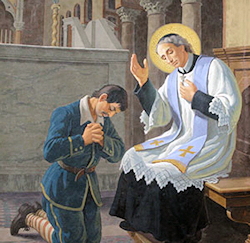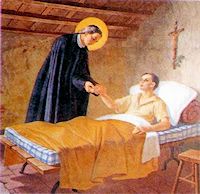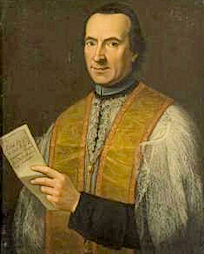Easter: May 23rd
Tuesday of the Seventh Week of Easter
Other Commemorations: St. John Baptist de Rossi, Priest (RM)
» Enjoy our Liturgical Seasons series of e-books!
The Roman Martyrology commemorates St. John Baptist de Rossi (1698-1764), who was from Genoa, and studied and worked in Rome before becoming a priest there and a canon of Santa Maria in Cosmedin. He worked tirelessly for homeless women, the sick, prisoners and workers, and was a very popular confessor, being called a second Philip Neri.
>>>Today is Day 6 of the Pentecost Novena to the Holy Spirit.<<<
St. John Baptist de Rossi

After three years he was called to Rome by a relative, Lorenzo de Rossi, who was canon at St. Mary in Cosmedin. He pursued his studies at the Collegium Romanum under the direction of the Jesuits, and soon became a model by his talents, application to study, and virtue. As a member of the Sodality of the Blessed Virgin and of the Ristretto of the Twelve Apostles established at the college, he led the members in the meetings and pious exercises, in visits to the sick in the hospitals and in other works of mercy, and merited even then the name of apostle.
At the age of sixteen he entered the clerical state. Owing to indiscreet practices of mortification he contracted spells of epilepsy, notwithstanding which he made his course of scholastic philosophy and theology, in the college of the Dominicans, and, with dispensation, was ordained priest on 8 March, 1721. Having reached the desired goal, he bound himself by vow to accept no ecclesiastical benefice unless commanded by obedience. He fulfilled the duties of the sacred ministry by devoting himself to the laborers, herds, and teamsters of the Campagna, preaching to them early in the morning, or late in the evening, at the old Forum Romanum (Campo Vaccino), and by visiting, instructing, and assisting the poor at the hospital of St. Galla. In 1731 he established near St. Galla another hospital as a home of refuge for the unfortunates who wander the city by night ("Rom. Brev.", tr. Bute, Summer, 573).
In 1735 he became titular canon at St. Mary in Cosmedin, and, on the death of Lorenzo two years later, obedience forced him to accept the canonry. The house belonging to it, however, he would not use, but employed the rent for good purposes.
 For a number of years John was afraid, on account of his sickness, to enter the confessional, and it was his custom to send to other priests the sinners whom he had brought to repentance by his instructions and sermons. In 1738 a dangerous sickness befell him, and to regain his health he went to Cività Castellana, a day's journey from Rome. The bishop of the place induced him to hear confessions, and after reviewing his moral theology he received the unusual faculty of hearing confessions in any of the churches of Rome. He showed extraordinary zeal in the exercise of this privilege and spent many hours every day in hearing the confessions of the illiterate and the poor whom he sought in the hospitals and in their homes. He preached to such five and six times a day in churches, chapels, convents, hospitals, barracks, and prison cells, so that he became the apostle of the abandoned, a second Philip Neri, a hunter of souls.
For a number of years John was afraid, on account of his sickness, to enter the confessional, and it was his custom to send to other priests the sinners whom he had brought to repentance by his instructions and sermons. In 1738 a dangerous sickness befell him, and to regain his health he went to Cività Castellana, a day's journey from Rome. The bishop of the place induced him to hear confessions, and after reviewing his moral theology he received the unusual faculty of hearing confessions in any of the churches of Rome. He showed extraordinary zeal in the exercise of this privilege and spent many hours every day in hearing the confessions of the illiterate and the poor whom he sought in the hospitals and in their homes. He preached to such five and six times a day in churches, chapels, convents, hospitals, barracks, and prison cells, so that he became the apostle of the abandoned, a second Philip Neri, a hunter of souls.
In 1763, worn out by such labors and continued ill-health, his strength began to ebb away, and after several attacks of paralysis he died at his quarters in Trinità de' Pellegrini. He was buried in that church under a marble slab at the altar of the Blessed Virgin. God honoured his servant by miracles, and only seventeen years after his death the process of beatification was begun, but the troubled state of Europe during the succeeding years prevented progress in the cause until it was resumed by Pius IX, who on 13 May, 1860, solemnly pronounced his beatification. As new signs still distinguished him, Leo XIII, on 8 December, 1881, enrolled him among the saints.
—Excerpted from The Catholic Encyclopedia
Patronage: of the abandoned
Highlights and Things to Do:
- Read the life of St. John Baptist de Rossi free at Google Books
- Read more about St. John Baptist de Rossi:
- His relics are located in Rome at the Church of San Giovanni Battista de Rossi.






